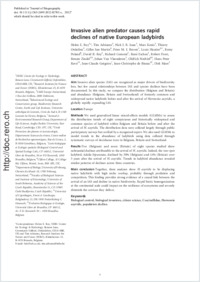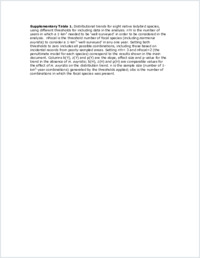Invasive alien predator causes rapid declines of native European ladybirds
- Roy, Helen E. NERC Centre for Ecology & Hydrology, Benson Lane, Crowmarsh Gifford, UK
- Adriaens, Tim Research Institute for Nature and Forest (INBO), Brussels, Belgium
- Isaac, Nick J. B. NERC Centre for Ecology & Hydrology, Benson Lane, Crowmarsh Gifford, UK
- Kenis, Marc CABI Europe-Switzerland, Delémont, Switzerland
- Onkelinx, Thierry Research Institute for Nature and Forest (INBO), Brussels, Belgium
- Martin, Gilles San Behavioural Ecology and Conservation group, Biodiversity Research Centre, Earth and Life Institute, Universite catholique de Louvain, Louvain-la-Neuve, Belgium
- Brown, Peter M. J. Animal & Environmental Research Group, Department of Life Sciences, Anglia Ruskin University, Cambridge, UK
- Hautier, Louis Unité Protection des plantes et écotoxicologie, Département Sciences du vivant, Centre wallon de Recherches agronomiques, Gembloux, Belgium - Lutte biologique et Ecologie spatiale (Biological Control and Spatial Ecology Lab, Université Libre de Bruxelles, Belgium
- Poland, Remy Clifton College, Clifton, Bristol, UK
- Roy, David B. NERC Centre for Ecology & Hydrology, Benson Lane, Crowmarsh Gifford, UK
- Comont, Richard NERC Centre for Ecology & Hydrology, Benson Lane, Crowmarsh Gifford, UK
- Eschen, René CABI Europe-Switzerland, Delémont, Switzerland
- Frost, Robert NERC Centre for Ecology & Hydrology, Benson Lane, Crowmarsh Gifford, UK
- Zindel, Renate CABI Europe-Switzerland, Delémont, Switzerland - Department of Biology, University of Fribourg, Switzerland
- Vlaenderen, Johan Van CABI Europe-Switzerland, Delémont, Switzerland
- Nedvěd, Oldrich Faculty of Biological Sciences and Institute of Entomology, University of South Bohemia, Academy of Sciences of the Czech Republic, České Budějovice, Czech Republic
- Ravn, Hans Peter University of Copenhagen, Forest & Landscape, Frederiksberg C. Denmark
- Grégoire, Jean Claude Lutte biologique et Ecologie spatiale (Biological Control and Spatial Ecology Lab, Université Libre de Bruxelles, Belgium
- Biseau, Jean Christophe de Evolution Biologique et Ecologie, Université Libre de Bruxelles, Belgium
- Maes, Dirk Research Institute for Nature and Forest (INBO), Brussels, Belgium
-
07.02.2012
Published in:
- Diversity and Distributions. - 2012, vol. 18, no. 7, p. 717-725
Biological control
biological invasions
citizen science
Coccinellidae
Harmonia axyridis
population decline
English
Aim Invasive alien species (IAS) are recognized as major drivers of biodiversity loss, but few causal relationships between IAS and species declines have been documented. In this study, we compare the distribution (Belgium and Britain) and abundance (Belgium, Britain and Switzerland) of formerly common and widespread native ladybirds before and after the arrival of Harmonia axyridis, a globally rapidly expanding IAS.Location EuropeMethods We used generalized linear mixed-effects models (GLMMs) to assess the distribution trends of eight conspicuous and historically widespread and common species of ladybird within Belgium and Britain before and after the arrival of H. axyridis. The distribution data were collated largely through public participatory surveys but verified by a recognized expert. We also used GLMMs to model trends in the abundance of ladybirds using data collated through systematic surveys of deciduous trees in Belgium, Britain and Switzerland.Results Five (Belgium) and seven (Britain) of eight species studied show substantial declines attributable to the arrival of H. axyridis. Indeed, the two-spot ladybird, Adalia bipunctata, declined by 30% (Belgium) and 44% (Britain) over 5 years after the arrival of H. axyridis. Trends in ladybird abundance revealed similar patterns of declines across three countries.Main conclusion Together, these analyses show H. axyridis to be displacing native ladybirds with high niche overlap, probably through predation and competition. This finding provides strong evidence of a causal link between the arrival of an IAS and decline in native biodiversity. Rapid biotic homogenization at the continental scale could impact on the resilience of ecosystems and severely diminish the services they deliver.
- Faculty
- Faculté des sciences et de médecine
- Department
- Département de Biologie
- Language
-
- English
- Classification
- Biological sciences
- License
- License undefined
- Identifiers
-
- RERO DOC 29075
- DOI 10.1111/j.1472-4642.2012.00883.x
- Persistent URL
- https://folia.unifr.ch/unifr/documents/302364
Other files
Statistics
Document views: 148
File downloads:
- pol_iap.pdf: 205
- pol_iap_sm.pdf: 147

